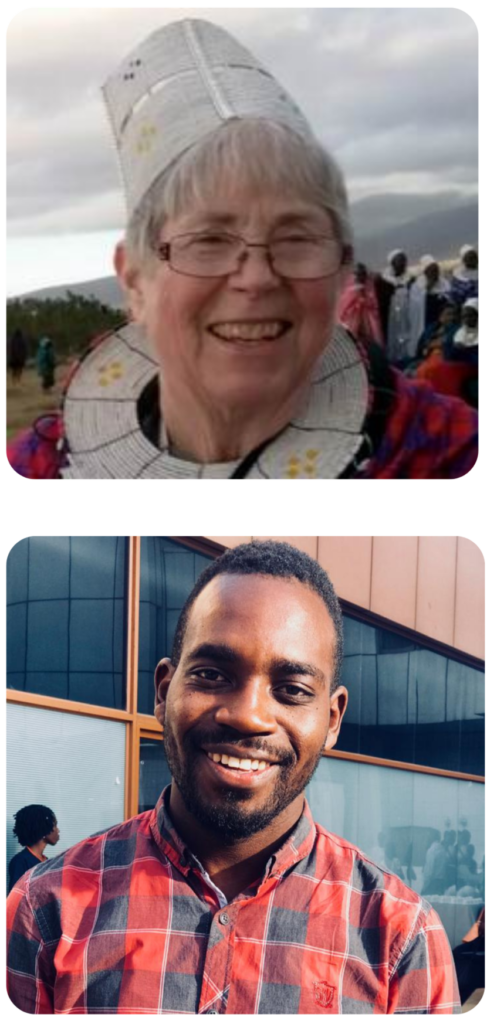Climate, Environment, and the Rights of Women and Girls
Karen Gaia Pitts, Project Coordinator for Transition Earth and founder of the Maasai Harmonial Development and Sustainability project, will discuss how the program focuses on the use of community-based solutions to enhance conservation practices, build resilient communities, and improve the health and well-being of local villagers. In addition, Joshua Mirondo, Transition Earth volunteer and Communications Team member at Reproductive Health Uganda, will share his on-the-ground experiences as a reproductive health trainer and peer educator.
About the Speakers

Karen Gaia Pitts, Maasai Harmonial Development and Sustainability
Karen Gaia Pitts is a native Californian who has been involved with population matters since 1996. The following year she started the website World Overpopulation Awareness, at overpopulation.org, which has since been discontinued. From 2000 to 2004 she served on the volunteer committee steering the Sierra Club Population Program. For the past 10 years, Karen has been the chair of the Population Committee for Sierra Club California. In 2016, Karen learned about a Maasai community in Tanzania that was interested in family planning and girls’ education. Contact: masai-harmonial@gmail.com
Joshua Mirondo, Reproductive Health Uganda & Transition Earth
Joshua Mirondo is a freelance blogger, digital marketer, and photographer. He is a graduate of Uganda Christian University, where he earned a bachelor’s degree in public administration and management. He also volunteers with Reproductive Health Uganda (RHU), where he is part of the communications team; Joshua has been a community-based reproductive health trainer and peer educator with RHU since 2015. He has a passion for using digital media for advocacy and has worked on projects that seek to empower women, girls, and young people to know their sexual reproductive health and rights in a country full of patriarchy and cultural norms that hinder access to these services.
Video Recording of Presentation
Presentation Slides
Climate Change and Women’s Rights in Uganda Presented by Joshua Mirondo
Maasai Harmonial Development & Sustainability: Girl’s Education & Women’s Health Presented by Karen Gaia Pitts
Q+A
What was the most unexpected lesson you learned during your work?
Karen: The most unexpected lesson was that family planning was easy once barriers were removed, a video educating on family planning education was seen, and health care was improved.
How has climate change impacted the rights of women locally?
Karen: There was a big drought in 2017 during which cattle died and maize was too expensive for the poor, especially the “widows” – women whose husbands have died or who left to get a low-paying night watchman job in faraway places.
What can you do from afar to help?
Karen: We could use help on the following projects:
- Practice English with the young women who are in tourist/wildlife college using WhatsApp (we could also use Spanish, French, and German)
- Find story ideas for the storybook project, again communicating via WhatsApp with the preschool teacher.
- Give advice on photography, Facebook, and other social media to the young woman who I am grooming to handle our publicity – using WhatsApp
- We rent farms and have a young woman who wants to develop farming expertise. We need someone familiar with agriculture, more specifically maize and beans.
How large a part did the Global Gag Rule play in making matters worse for Ugandan women?
Karen: It is difficult to know the effect of the GGR in our community. What we do know is that the family planning rate has fallen due to a language barrier. We are waiting to see the next (and hopefully better) report from the health center. We also know that Marie Stopes, who provided us with family planning the first time, has received lower funding from the UK. In addition, our health educator, who is in medical college until September, told me that the use of family planning has gone down since she interpreted the health classes.
Clearly, exposure to contraception needs to happen before the first sexual experience. What is the best strategy to do this?
Karen: First in remote areas, barriers to family planning must be removed, or worked around:
- Language difference between patient and provider
- Remote location
- Lack of basic education
- Lack of information and/or superstition about family planning methods
- Home births (no opportunity for education from the doctor)
- Long-distance from community to the hospital
- Failure to take a sick baby to the doctor
- Lack of family planning training for the doctor
- Lack of family planning methods, supplies & equipment
- Pressure from the husband or community to produce babies
- Racial prejudice on the part of medical personnel (who treat the patient badly)
- The suspicion that the doctor is a eugenicist.
Second, in school young girls need to have sex education, including instruction about family planning.
To what extent might classroom education replace or conflict with indigenous education, which is important to maintain for its ties to conservation?
Karen: There are many Maasai who are educated and who still follow the old ways, including traditional conservation (or they would if the Authorities would let them) although they do want to improve their houses. They have a long oral history, which they honor through several traditional ceremonies, even the ones who are educated. Some of them do move out of the conservation area, and many support their families inside the conservation area and return for ceremonies.
Videos from Karen's PowerPoint
Slide 17: Ceremonial Dressware and Dancing
Slide 32: Phonetics Lesson
Slide 51: Woman Villager’s Testimonial
Slide 52: Annual Student Celebration
Slide 53: Women Villagers Receiving Maize
Slide 79: Preschoolers Singing “Goodbye Song”
